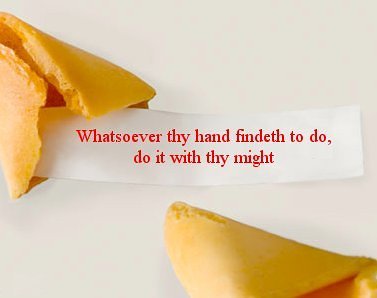Archive for the ‘Money and the Old Testament’ Category

"but time and chance happeneth to them all"
“Whatsoever thy hand findeth to do, do it with thy might; for there is no work, nor device, nor knowledge, nor wisdom, in the grave, whither thou goest.
I returned, and saw under the sun, that the race is not to the swift, nor the battle to the strong, neither yet bread to the wise, nor yet riches to men of understanding, nor yet favour to men of skill; but time and chance happeneth to them all.”
The bible dictionary explains that the first verse in this citation is not a doctrinal pronouncement that after death there is nothing –rather, this is a worldly view – people “under the sun” believe that.
This scripture tells us that whatever vocation we choose (whatever we do with our hands) we should do our best, and put our energies into it. It also explains that no matter how smart you may be, how hard or fast your work, no matter how skilled or what brilliant ideas you may have, success comes and goes as a matter of chance. A friend of mine believes that wealth is a blessing of the Lord that is given to certain individuals and not to others, whether you strive for it or not. He explains how some wealthy, with the craziest bumbling ideas you can imagine, seem to make a tidy fortune despite themselves. alternatively, I’m sure we all know others who seems to have brilliant ideas and excellent work ethic, but never quite attain to any financial success – and teeter on the edge of poverty for their whole lives.
I personally agree with this line of thought to the extent that the Lord does bless some of us with wealth and other not. I believe that as we are obedient, more often than not, the Lord does bless us with prosperity, which often manifests itself as financial success, but this is not a hard and fast rule. In the general this applies, but specifically the case may be different, depending on what the Lord has planned for you.

Toronto Temple Coin
Thanks to my good friend Gavin who pointed this one out to me.
Highlights from Haggai 1:5-9. (Old Testament, p.1166 in the LDS Edition of the Old Testament)
” …Consider you ways.
Ye have sown much, and bring in little; ye eat, but ye have not enough; ye drink, but ye are not filled with drink; ye clothe you, but there is none warm; and he that earneth wages earneth wages to put it into a bag with holes.
This saith the Lord of hosts; Consider your ways.
Go up to the mountain, and bring wood, and build the house; and I will take pleasure in it, and I will be glorified, saith the Lord.
Ye looked for much, and, lo, it came to little; and when ye brought it home, I did low upon it. Why? saith the Lord of hosts. Because of mine house that is waste, and ye run every man unto his own house.”
This scripture was written shortly after (17-18 years) the Jews return to Jerusalem from the captivity in Babylon.
We know that the common reference to the “mountain of the Lord” means the temple. The Lord was saying through Haggai that although effort was put in to earn wealth and provide for oneself and family, the return just wasn’t quite enough. Where were the blessings of heaven? Why did they struggle? It is revealed here that the temple had to be rebuilt and used.
Most reading this are in relatively close proximity to a temple. Are we using it the way we should? Would Haggai’s words apply to us? Make sure your temple attendence (and worthiness) is not lacking so the Lord doesn’t withhold monetary success from you because of your poor temple attendence. Temple worship is a great, peaceful experience; a way to serve others and the Lord’s purposes. And — as noted here, it can help make sure your are getting enough and more.